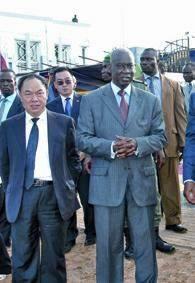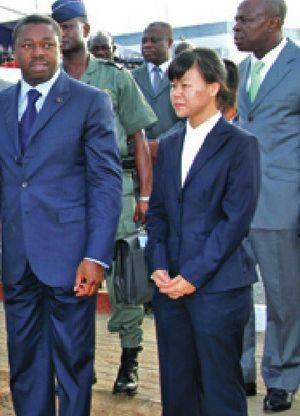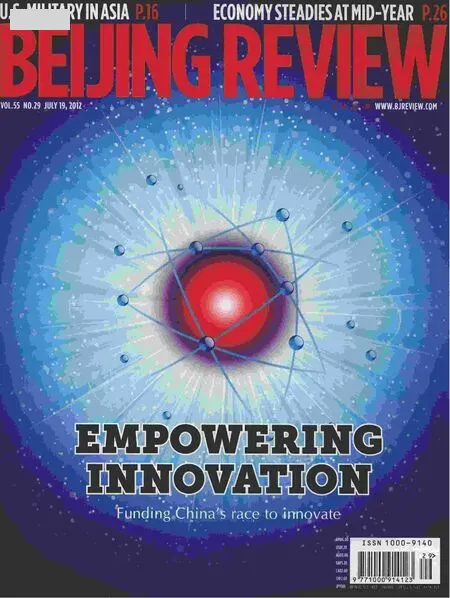Forging Sino-African Relations


Beijing Review: What topics will this years Fifth Ministerial Conference of FOCAC focus on?
Lu Shaye: The Fifth Ministerial Conference is the first conference to be held in the second decade since the founding of FOCAC in 2000. This conference is of great significance in terms of further strengthening ChinaAfrica unity and cooperation, and promoting and guiding the future development of SinoAfrican relations.
At this conference, participants will review the development of Sino-African relations over the past 12 years of FOCAC since its inception, evaluate consequential activities of the past three years following the Fourth FOCAC Ministerial Conference in 2009, and discuss plans for cooperation in the next three years.
FOCAC stresses both political and economic sectors through government and people-to-people channels. Thus, the conference will also feature side meetings: The China Council for the Promotion of International Trade and the China NGO Network for International Exchanges will hold the Fourth Conference of Chinese and African Entrepreneurs and the Second ChinaAfrica Peoples Forum in Beijing and Suzhou(Jiangsu Province), respectively, in mid-July.
What sectors will FOCAC focus on in the next three years?
After reviewing FOCACs past development, we can say that FOCAC is the engine driving the development of Sino-African relations in all facets. Following the excellent traditions of the previous FOCAC ministerial conferences and the Beijing summit, we will not only plan and strengthen exchanges in areas such as politics, the economy, development and culture, but we will also focus on important areas with our unique characteristics.
While continuing efforts to promote pragmatic cooperation in economic and trade sectors, greater attention will be given to the political and cultural exchanges between our two sides. Therefore, at this years conference, China will actively consider putting forward new measures for cooperation in important areas such as development, investment and financing, Africa integration, security and people-to-people contact.
Since FOCACs establishment 12 years ago, China-Africa relations have greatly developed. What has FOCAC done to restructure itself accordingly?
Following its establishment in 2000, FOCAC has developed into an important platform for promoting Sino-African relations, as well as a strong brand of Africa-related international cooperation. During this process, FOCAC has become increasingly mature.
First, the FOCAC mechanism has become more effective. It has enabled many opportuni- ties for Sino-African dialogues at various levels. These include ministerial conferences and political consultations between the foreign ministers of China and African countries at the UN General Assembly. Last year, the African Union was officially admitted into FOCAC, making way for greater African representation.
Next, we provided a wide diversity of talking points. FOCAC now holds the Conference of Chinese and African Entrepreneurs and subforums in areas such as agriculture, culture, think tanks, NGOs and finance.
Finally, FOCAC has taken long-term measures to increase its influence. Chinese President Hu Jintao announced eight measures for practical Sino-African cooperation at the FOCAC Beijing Summit in 2006, and Chinese Premier Wen Jiabao put forward eight new measures at the Fourth FOCAC Ministerial Conference in Egypt in 2009. These measures aim to promote win-win development and lift the levels of pragmatic China-Africa cooperation.
Would you talk about the measures proposed by Premier Wen in 2009? Have all the measures been implemented?
In the past three years, China has diligently kept its commitments to Africa despite challenges from the global financial crisis. Thanks to joint efforts from both China and countries in Africa, the eight new measures put forward by Premier Wen have been put into practice. The ChinaAfrica Science and Technology Partnership Program and another partnership program established to cope with climate change are progressing smoothly. Debt exemption, tariff cuts, preferential loans and special loans for the development of African small and medium-sized enterprises are being implemented. Training programs for Africans in areas such as science and technology, agriculture, education and health have been fully carried out.
At the coming Fifth FOCAC Ministerial Conference, Chinese Foreign Minister Yang Jiechi and Minister of Commerce Chen Deming will discuss in detail the follow-up activities of the Fourth FOCAC Ministerial Conference, including the implementation of these eight measures.
Beijing Review: The Fifth FOCAC Ministerial Conference is to be held in mid-July. What are your expectations for the conference?
Nolana Ta-Ama: Let me say, first, that FOCAC is a fundamental part of international cooperation. Therefore, it is one of the most important components of China-Africa relations. About the environment of the ChinaAfrica relations, we have to appreciate that equality and mutual respect have been and still are the main principles of reference.
FOCAC was created on the agreement that this partnership should be developed on the criteria of South-South cooperation, in a way to create a kind of dialogue which would be an institutionalized platform for the promotion of African economic development.
This is why, every three years, especially since the 2006 Beijing summit, consultations are launched and aimed at a stronger strategic partnership to expand China-Africa cooperation to all the actors of African development.
The Fifth FOCAC Ministerial Conference, scheduled for July, will cover the topic of consolidating the achievements and opening new perspectives for the SinoAfrican strategic partnership. The conference will review steps taken in the development of Sino-African relations up to now.
This conference will also work toward strengthening the achievements, and look at the necessity of expanding the FOCAC members to maintain peace through the development of regional infrastructures and the development of security inside and outside member countries.
At the Fourth FOCAC Ministerial Conference held in Sharm el-Sheikh in Egypt in 2009, Chinese Premier Wen Jiabao proposed eight measures to promote ChinaAfrica cooperation. In your country Togo, have all these measures been implemented? In what sectors did your country strengthen cooperation with China under this platform? Without hesitation I answer yes! In fact, over and above the loans for investments in big infrastructures, I can say that the Chinese Government approved the debt remission for our country and initiated projects such as well digging, school construction, solar energy, cooperation in and demonstration of agricultural technologies, hospital equipment, supplementary material offered to the center concerning malaria, as well as anti-malarial medications.
What sectors do you hope FOCAC will focus on in its future efforts to promote joint development of China and African countries?
Highlighted sectors will probably concentrate their efforts on research in the construction of peace and security through integration and development policies within the framework of the African Union and the New Partnership for Africas Development, to accomplish sustainable development.
FOCAC has been running for more than 10 years. Do you think the mechanism should be reformed according to new developments in Sino-African relations?
Ten years of cooperation through the forum prove that the mechanism it established works correctly due to follow-ups, based mostly on permanent consultation between the two parties of the forum—China and the African states.
Obviously, like any human effort, this construction has room for improvement, and it is right that the base of the forum should expand constantly with the integration of women, business persons, jurists, NGOs and universities that organize think tank groups.
A China-aided agricultural technology demonstration center in Togo was completed in late April. What do you think of the role of the center in terms of facilitating agricultural exchanges between China and Togo?
The agricultural technology demonstration center is unanimously acknowledged as one of the most valuable contributions of China to the development of agriculture in Togo and other countries of the region. It is with real satisfaction and gratitude that we see the continuous research on the development of agriculture occupying a special place in the implementation of the eight measures set for Africa.

